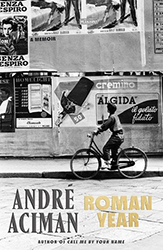The Man in the White Sharkskin Suit, Lucette Lagnado’s memoir, is at once an elegy to Cairo and an elegy to her father. Cairo in the 1940’s was hailed as the Paris of Africa, where wealthy multicultural citizens mingled in dance halls and French cafes, Jews and Arabs lived in harmony, where “no self-respecting belly-dancer would ever think of making an appearance until the stroke of midnight,” and even Farouk, the spoiled boy king of Egypt, was known to make appearances skirting off the prettiest women. Leon, Lagnado’s father, was as much an embodiment of the nightlife as anything else, suave, charismatic, a forty-year old bachelor known as “The Captain” with a flair for expensive white sharkskin suits. His single life comes to an abrupt end when he proposes to Lagnado’s mother at their first meeting and a rocky marriage ensues. The situation deteriorates further when revolution takes Egypt, and the family is forced to flee, first to Paris and then to America. There, in America, in a reverse of the immigrant dream, Leon truly fails, becoming a religious recluse, spending ten to twelve hours in the synagogue praying into a tattered red prayer book. Despite the heartbreak, what emerges from this haunting memoir is a single scene of a dashing figure dressed in white, scented with citrus flavored aftershave, stepping out into the bustling Cairo night. Like The Lost before it, The Man in the White Sharkskin Suit is a haunting portrait of a forgotten people, a forgotten place, and a forgotten time.

The Man in the White Sharkskin Suit: My Family’s Exodus From Old Cairo to the New World
Discussion Questions
1. Author Lagnado dedicates her book in part to the memory of her parents yet does Leon emerge as a sympathetic character at the end — in spite of his flaws — or are his trespasses and libertine ways — not to mention his illtreatment of his wife — simply unforgivable to any enlightened reader?
2. Loulou seems wistful about the life she left behind, and she casts a sentimental eye on the relations between Jews and Moslems in this corner of the Arab world, certainly as they co-existed in her parents’ era; and even when she returns, while she notes the physical decay in Egypt, she sees only love and sweetness in the Egyptians that she meets. Is this a credible portrait of Arab-Jewish relations in post‑9/11 world and also why is she not acknowledging the bitterness and anger that her family almost surely felt and continued to feel after being pushed to leave Egypt?
3. Lagnado casts a cold eye on the American Dream. Is this a fair portrayal of the shattered hopes of an immigrant family, and is it fair on Lagnado’s part to dismiss what America has given her and her family.
4. Lagnado casts a ruthless eye on the American health system, its hospitals and in particular its nursing homes. The Jewish Home and Hospital is seen as a cruel uncaring facility that devotes more love on its fish than its patients; Mt. Sinai Medical Center in New York is seen as inferior to the Demerdash Hospital in Cairo. How do the author’s experiences and her ordeal navigating these facilities compare with yours?
The Beginnings of The Man in the White Sharkskin Suit
By Lucette Lagnado
On the week my father died about a dozen years ago this month, I made my way to a small synagogue on the East Side I thought would provide some comfort – a Sephardic shul with a congregation from Morocco, Tunisia, Yemen, and Algeria, with a sprinkling of some Egyptian and Syrian Jews.
As I sat praying, an old woman quietly approached me. She said that she had known my father as a young girl in WWII Cairo. Her mother would host a nightly poker game at their home, and my Dad was a frequent visitor. She vividly recalled watching him from her balcony as he approached, tall and striking and intensely elegant. “He always wore white – white sharkskin,” she said.
In the midst of these dark days, this woman offered me a hopeful, light-filled image: My father striding through the streets of Cairo in his suit of white sharkskin.
Looking back, I believe the idea for this book about my dad began there, even as I was in the midst of mourning his loss. I became friends with this woman, who is now in her 80s, and at first, I would question her obsessively about my dad in white sharkskin. Years before these details became crucial to the construction of the book, I would grill her about the cut of his suits, what type of shirt he wore, what color tie, what color shoes (two-toned).
Eventually the conversation broadened to the world where men wore white sharkskin – the world of Old Cairo, a glamorous, intensely cosmopolitan city that was multicultural in the true meaning of the term, a society in which Jews and Moslems and European Christians managed to co-exist with a harmony that some in post‑9/11 America may find hard to imagine.
Recreating that vanished world became one of my major goals as I began to work on .
The Man In the White Sharkskin Suit
Another was to tell of exile and loss but through the eyes and in the voice of a child – the child that I was when we left Cairo.
Loulou, my six-year-old narrator, doesn’t exactly grasp the events that are rocking the Middle East and making it inhospitable for her family, and so in the face of the changes that are transforming her world, she latches on to beloved objects and places. Instead of obsessing, as her parents do, over the loss of a King and a country, Loulou agonizes over the loss of her cat Pouspous and her home on Malaka Nazli Street, a grand sweeping boulevard named after a queen.
She fixates on sardine cans, dolls, the patisserie where she goes every day with her dad, the private school she attends, and they, like her home on Malaka Nazli, acquire a certain life of their own and haunt her on her journeys from Cairo to Paris to New York.
She is especially enthralled with the vendors who come every morning to the house with their wares.
Some days the baskets are filled with fresh figs or grapeleaves, oranges perhaps, or at times baskets of rose petals to make jam.
The rose petal vendors have a particularly stirring sing-song and that song will haunt Loulou wherever she goes; she will hear it in Paris and in New York and even occasionally while working late at night at the offices of .
The Wall Street Journal

Help support the Jewish Book Council.




